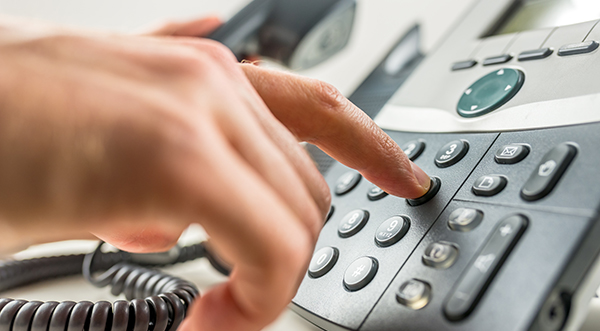10 Tips for Talking to Customers On the Phone
By Space Coast Daily // February 23, 2021

Phone calls are still an essential part of customer service for any business. These allow businesses to connect with customers in real-time and help them address queries that customers might have about their products and services.
Phone calls can also help businesses increase their sales and gain information from customers that can help them improve their existing processes.
With the number of benefits phone calls can provide, it’s no wonder why businesses are still using these in their daily operations. In fact, you won’t be able to find businesses that don’t advertise their phone numbers on their physical stores and websites.
If you want your business to stand out from the competition, it’s not enough that you offer a phone number to your customers; you should also make sure that they’re treated well on the phone.
How your employees talk on the phone can leave an impression on customers, and the experience can influence the customer’s decision to buy and remain loyal to you.

To ensure that your employees impress customers on the phone employ a professional business phone answering service and follow these tips:
Make Small Talk
Simply defined, small talk is an informal type of conversation about uncontroversial and unimportant matters. While small talk is common when you’re waiting in a doctor or dentist’s room or during lunch breaks at work, do you know that you can also do small talk with customers over the phone?
If you just invested in one of the best software for phone calls, like Call Cowboy Auto Dialer, make the most of it by doing small talk with your customers.
Making small talk is a great way to distract customers during a long wait time and give you more time to look up information relevant to their concerns. This can also help you create a healthy relationship with them.
You can checkout Quicktalk to find out how many international destinations you can make FREE calls and receive customer calls, apart from how to forward and monitor customer calls with all the vital call statistics. So, try getting the best out of this dynamic call management system or software, and sound professional to your customers/clients while closing deals or impressing prospects.
To make small talk the right way, take note of the following:
Ask questions: Small talk is all about your customers, so utilize this time to know more about them – how their day went, how long they’ve been loyal to the business; you get the idea.
Stay engaged: Even if you’re busy looking for your customer’s information in front of the computer, you should still stay engaged to the call. You can do this by actively listening and noticing small things from their statements that could be great ice breakers.
Avoid difficult topics: The key to making small talk with a customer is to make sure that topics are a no-brainer, which is why you should never discuss difficult or controversial topics, like politics, religion, morals, and current affairs.
Use Positive Language
When talking to customers on the phone, the words you use in the conversation are important. In fact, the way you frame your conversation can significantly affect their outlook on the entire call and even the image they create for your business.
Using positive language is always necessary when talking to customers on the phone. Positive language can prevent conflicts due to miscommunication and keep the conversation moving forward. As much as possible, you should avoid using the words and phrases “can’t, didn’t, you need to, and you have to” as these constitute negative language.
Instead of saying, “I can’t give you the product until next month because it’s unavailable at this time,” tell customers on the phone, “It looks like the product that you want to order will be re-stocked this month. I can place an order in advance, so it’ll be sent to your address as soon as possible.”
Using positive language can effectively redirect the focus of the conversation and allow customers to see the proposed solution rather than the problem at hand. When customers realize that the person they’re talking to is going the extra mile to solve their dilemma, their odds of being upset or angry will decrease.
Apologize Sincerely
More often than not, customers will utilize your business’s VoIP number because they’re unhappy with your products or services or both. If a customer can’t figure out how to assemble your product, for example, they’ll call your business for help. They will likely do the same if they’re frustrated with your return policies or delays in their orders.
If you want your business to thrive and keep customers, take responsibility for their unhappiness and apologize once they call your line.
Doing this will not make your business the antagonist in the situation or give customers the right to demand whatever they want from the business; apologizing sincerely will put your customers’ minds at ease because they’ll now have someone to talk to and not be angry at a faceless company.
However, when apologizing over the phone, make sure that you don’t spend too much time or linger too much on the apology. After you’ve said “sorry” for the lapses committed by the business, move forward by focusing on what you can do about it and how you can prevent the problem from happening again in the future.
Solving the cause of your customers’ unhappiness and assuring them that they’ll have a better experience in the future will make customers feel that your business is genuinely sorry for its mistakes.
Prioritize Honesty
Honesty is still the best policy when it comes to providing customer service on the phone. Regardless of how frustrated or angry the customer is, you should never give false hopes in an attempt to pacify the situation. Doing this will only aggravate any negative emotions the customers have for the business and can become the reason they’ll discontinue buying from you.
When talking to customers on the phone, be straightforward about your responses and the solutions you’ll provide to their concerns. If you know that a customer isn’t qualified to avail of free delivery services, let them know about it upfront rather than putting them on hold to ask other teams about their qualifications.
Most customers can detect whether the person they’re talking to on the phone is being dishonest – and when this happens, don’t expect that it’ll do any good for your business. Dishonesty can shoo away customers and will motivate them to speak negatively about your business.
Be An Active Listener
It’ll be challenging for you to address any of your customer’s concerns or address their needs if you don’t have any idea what they’re talking about. Instead of helping them out, your inability to listen to them will only cause them to be irate.
One of the most important tips to follow when talking to customers on the phone is to make sure that you actively listen. Regardless of how stressed you are because of your personal problems, you should always take calls with a clear mind and focus on the conversation.
For you to become an active listener, be active in the conversation and ask questions or clarifications whenever necessary. One of the worst things customers can experience when they’re on the phone is to talk about their concerns for hours and then, later on, find out that the customer service rep on the other line didn’t understand their sentiments.
Going over a quick recap of the problem and information given will also make the customers feel that you’re actually listening to them. Make sure that you don’t interrupt when they’re talking, and take down notes so that you won’t miss out on important details.
Speak Clearly
Phone calls should be utilized as a two-way communication tool for your business and the customers. Even if your customers were able to express their frustrations about a product or service, the call would still be useless if your business can’t convey solutions to the customers.
Another tip that you should follow when talking to customers on the phone is to speak clearly. This is important to ensure that customers hear and understand what you have to say. Speaking clearly can also prevent any conflicts and ensure that both parties are on the same page.
If you’re still having problems speaking clearly on the phone, these tips can help:
Slow down: Before you take any calls, take a deep breath and calm yourself down. You’ll be able to speak clearly on the phone if there is enough air in your lungs.
Articulate your words: Be cautious and make sure that you’re able to articulate your words when talking on the phone.
Practice tongue twisters: During your leisure, practice some tongue twisters as these exercises are known to clarify the pronunciation of words.
Use Your Customer’s First Name
Contrary to popular belief, effectively talking to customers on the phone doesn’t always require complicated strategies; addressing your customers by their first name is enough to do the trick.
Aside from making the conversation more personal, addressing your customers by their first names will also get their full attention and allow them to listen more attentively to your ideas and thoughts. Because a person’s first name is the most important sound in any language, addressing your customers in their first names will make them feel validated and important.
However, when using your customer’s first name during calls, make sure that you get it right. Kate is different from Katie, and Kirsteen is different from Christine. Pay attention to how customers will pronounce their names when they introduce themselves on the phone, so you won’t end up mispronouncing their names.
Talk Their Talk
When you advertise your business’ phone number to the public, expect that you’ll receive dozens of calls from different customers. In fact, you’ll be receiving too many calls from customers who react differently to the same problem or concern.
For you to effectively communicate with your customers on the phone, understand their differences, and exert effort to “talk their talk.” This means that if the customer sounds formal, you should hold back on the jokes and humor and adjust accordingly to their tone. If the customer sounds very casual over the phone, relax your tone. If their tone seems very excited, make sure that you also match their energy.
Although it can be challenging at first, mirroring your customers’ tone and emotion over the phone is a great way to build rapport. This practice will also put your customers at ease and will make it easier for them to understand what you’re saying. Plus, this will also bring more emotion to the conversation and prevent you from sounding too robotic.
Be Careful When Cracking Jokes
Cracking jokes with a friend is always a good way to start a conversation. Both of you will be calmer and more relaxed when you start the conversation with humor. While jokes can also bring the same benefits when shared with a customer on the phone, you need to be careful with your efforts to avoid any conflict or miscommunication.
If you want to inject humor into your conversations on the phone, do it sparingly and make sure that it’s relatable. You can share funny stories that happened to you in the office or experiences that are similar to your customers’ stories.
Offer To Help Them Further
Most of your customers live a hectic lifestyle and will not call your number unless necessary. Customers will try to solve problems on their own, but if they failed after several attempts, they would choose to call your business for help.
Your customers are in distress when they call your number, so make sure that you offer as much help as possible. After hearing their concerns and providing solutions, strive to end the call by offering more help. Instead of making customers feel that you’re hurrying to finish the call, invite them to continue the conversation by letting them know that you’re willing to extend more help if they have any other concerns.
Don’t forget to let your customers know that you’re happy to assist them and that all of their concerns and questions are valid, regardless of how “silly” they think these are.
Auditing Counts
Giving customers the best experience on the phone should be one of your business’ priorities. Aside from gradually incorporating the tips in this article into your business, don’t forget to allocate resources for regular auditing, as well.
Regular audits are vital to determine if the strategies you’ve applied are working and if any of these strategies need improvement moving forward. Over time, your audits will make it easier for the business to come up with the best strategies in talking to customers on the phone.












